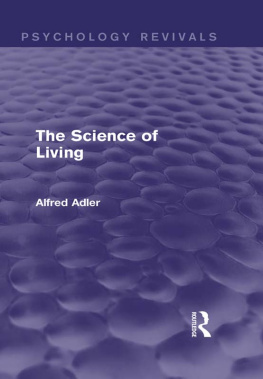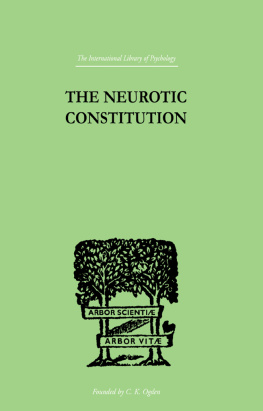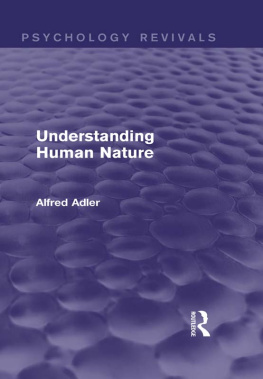Adler - The Science of Living
Here you can read online Adler - The Science of Living full text of the book (entire story) in english for free. Download pdf and epub, get meaning, cover and reviews about this ebook. City: London, year: 2013, publisher: Taylor and Francis;Routledge, genre: Religion. Description of the work, (preface) as well as reviews are available. Best literature library LitArk.com created for fans of good reading and offers a wide selection of genres:
Romance novel
Science fiction
Adventure
Detective
Science
History
Home and family
Prose
Art
Politics
Computer
Non-fiction
Religion
Business
Children
Humor
Choose a favorite category and find really read worthwhile books. Enjoy immersion in the world of imagination, feel the emotions of the characters or learn something new for yourself, make an fascinating discovery.
The Science of Living: summary, description and annotation
We offer to read an annotation, description, summary or preface (depends on what the author of the book "The Science of Living" wrote himself). If you haven't found the necessary information about the book — write in the comments, we will try to find it.
The Science of Living — read online for free the complete book (whole text) full work
Below is the text of the book, divided by pages. System saving the place of the last page read, allows you to conveniently read the book "The Science of Living" online for free, without having to search again every time where you left off. Put a bookmark, and you can go to the page where you finished reading at any time.
Font size:
Interval:
Bookmark:
Originally published in 1930 The Science of Living looks at Individual Psychology as a science. Adler discusses the various elements of Individual Psychology and its application to everyday life: including the inferiority complex, the superiority complex and other social aspects, such as, love and marriage, sex and sexuality, children and their education. This is an important book in the history of psychoanalysis and Adlerian therapy.
The Science of Living
Alfred Adler

First published in 1930
by George Allen & Unwin Ltd
This edition first published in 2013 by Routledge
27 Church Road, Hove, BN3 2FA
Simultaneously published in the USA and Canada
by Routledge
711 Third Avenue, New York, NY 10017
Routledge is an imprint of the Taylor & Francis Group, an informa business
All rights reserved. No part of this book may be reprinted or reproduced or utilised in any form or by any electronic, mechanical, or other means, now known or hereafter invented, including photocopying and recording, or in any information storage or retrieval system, without permission in writing from the publishers.
Publisher's Note
The publisher has gone to great lengths to ensure the quality of this reprint but points out that some imperfections in the original copies may be apparent.
Disclaimer
The publisher has made every effort to trace copyright holders and welcomes correspondence from those they have been unable to contact.
ISBN: 978-0-415-81734-9 (hbk)
ISBN: 978-0-203-38675-0 (ebk)
BY THE SAME AUTHOR
UNDERSTANDING HUMAN NATURE
Small Demy 8vo. 12/6 net
THE CASE OF MISS R.: THE
INTERPRETATION OF A LIFE STORY
Lar. Cr. 8vo. 12/6 net
The Science
of Living
By Alfred Adler
London
George Allen & Unwin Ltd.
Museum Street
Copyright in U.S.A., 1929.
First Published in Great Britain, 1930.
All Rights Reserved.
PRINTED IN GREAT BRITAIN
BY LOWE AND BRYDONE PRINTERS LTD., LONDON, N.W.I.
DR. ALFRED ADLER'S work in psychology, while it is scientific and general in method, is essentially the study of the separate personalities we are, and is therefore called Individual Psychology. Concrete, particular, unique human beings are the subjects of this psychology, and it can only be truly learned from the men, women and children we meet.
The supreme importance of this contribution to modern psychology is due to the manner in which it reveals how all the activities of the soul are drawn together into the service of the individual, how all his faculties and strivings are related to one end. We are enabled by this to enter into the ideals, the difficulties, the efforts and discouragements of our fellow-men, in such a way that we may obtain a whole and living picture of each as a personality. In this co-ordinating idea, something like finality is achieved, though we must understand it as finality of foundation. There has never before been a method so rigorous and yet adaptable for following the fluctuations of that most fluid, variable and elusive of all realities, the individual human soul.
Since Adler regards not only science but even intelligence itself as the result of the communal efforts of humanity, we shall find his consciousness of his own unique contribution more than usually tempered by recognition of his collaborators, both past and contemporary. It will therefore be useful to consider Adler's relation to the movement called Psycho-analysis, and first of all to recall, however briefly, the philosophic impulses which inspired the psycho-analytic movement as a whole.
The conception of the Unconscious as vital memorybiological memoryis common to modern psychology as a whole. But Freud, from the first a specialist in hysteria, took the memories of success or failure in the sexual life, as of the firstand almost the onlyimportance. Jung, a psychiatrist of genius, has tried to widen this distressingly narrow view, by seeking to reveal the super-individual or racial memories which, he believes, have as much power as the sexual and a higher kind of value for life.
It was left to Alfred Adler, a physician of wide and general experience, to unite the conception of the Unconscious more firmly with biological reality. A man of the original school of psycho-analysts, he had done much work by that method of analyzing memories out of their coagulated emotional state into clearness and objectivity. But he showed that the whole scheme of memory is different in every individual. Individuals do not form their unconscious memories all around the same central motivenot all around sexuality, for instance. In every individual we find an individual way of selecting its experiences from all possible experience. What is the principle of that selectivity? Adler has answered that it is, fundamentally, the organic consciousness of a need, of some specific inferiority which has to be compensated. It is as though every soul had consciousness of its whole physical reality, and were concentrated, with sleepless insistence, upon achieving compensation for the defects in it.
Thus the whole life of the small man, for instance, would be interpretable as a struggle to achieve immediate greatness in some way, and that of a deaf man to obtain a compensation for not hearing. It is not so simple as that, of course, for a system of defects may give rise to a constellation of guiding ideas, and also in human life we have to deal with imaginary inferiorities and fantastic strivings, but even here the principle is the same.
The sexual life, far from controlling all activities, fits perfectly into the frame of those more important strivings, for it is pre-eminently under the control of emotion, and emotion is moulded by the entire vital history. Thus a Freudian analysis gives a true account of the sexual consequences of a given life-line, but it is a true diagnosis only in that sense.
Psychology becomes now for the first time rooted in biology. The tendencies of the soul, and the mind's development, are seen to be controlled from the first by the effort to compensate for organic defects or for positions of inferiority. Everything that is exceptional or individual in the disposition of an organic being originates in this way. The principle is common to man and animal, probably even to the vegetable kingdom also; and the special endowments of species are to be taken as arising from experience of defects and inferiorities in relation to their environment, which has been successfully compensated by activity, growth and structure.
There is nothing new in the idea of compensation as a biological principle, for it has been long known that the body will over-develop certain parts in compensation for the injury of others. If one kidney ceases to function, for instance, the other develops abnormally until it does the work of both; if the heart springs a leak in a valve, the whole organ grows larger to allow for its loss of efficiency, and when nervous tissue is destroyed, adjacent tissue of another kind endeavours to take on the nerve-function. The compensatory developments of the whole organism to meet the exigencies of any special work or exertion are too numerous and well known to need illustration. But it is Dr. Adler who has first transferred this principle bodily to psychology as a fundamental idea, and demonstrated the part it plays in the soul and intellect.
Font size:
Interval:
Bookmark:
Similar books «The Science of Living»
Look at similar books to The Science of Living. We have selected literature similar in name and meaning in the hope of providing readers with more options to find new, interesting, not yet read works.
Discussion, reviews of the book The Science of Living and just readers' own opinions. Leave your comments, write what you think about the work, its meaning or the main characters. Specify what exactly you liked and what you didn't like, and why you think so.
















